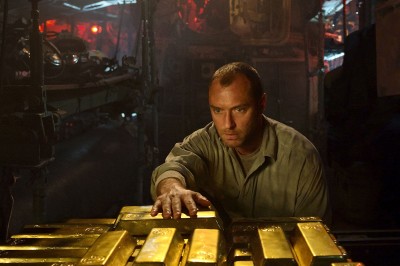
At first glance, the title and concept of Mike Binder’s drama “Black or White” may seem simple and unimpressive: a white man in a custody battle over his granddaughter against her black grandmother. From the previews, one might expect a family-friendly drama, its timely theme of race relations watered down to make a palatable, uplifting story in which love conquers all. In some ways, “Black or White” may fulfill this role, but the film isn’t so easily stereotyped.
Toward the beginning of the film, Elliot Anderson (Kevin Costner) tells his lawyers, “It’s not about black and white. It’s about right and wrong.” Here, Elliot sums up the entire plot: after Elliot’s wife (played by Jennifer Ehle in a series of flashbacks) dies in a car crash, he’s left to raise their granddaughter, Eloise (Jillian Estell), whose own mother, Elliot’s daughter, died during childbirth.
This responsibility is problematic, considering he, a man with a full-time law firm job, may not be the best-fit guardian for the bubbly child. That, and his drinking problem has grown increasingly severe since losing his daughter and wife. Still, Elliot lives in an affluent SoCal neighborhood, and he can afford to send Eloise to a great private school and hire a specialized tutor to help her in math (and drive her to school when Elliot is too intoxicated). Eloise’s father Reggie (Andre Holland) is barely in the picture, though his drug problems and responsibility shirking had only caused problems in the past.
On the other hand, Eloise’s paternal grandmother Rowena (Octavia Spencer) supports an extensive and varied family in Compton, California. Rowena wants Eloise to know and love this side of her family, worried Eloise is essentially whitewashed by Elliot’s parenting. But Elliot’s fear of Rowena’s unsafe neighborhood, his grudge against Reggie and his personal dislike of the cloyingly charismatic Rowena keep him from sharing Eloise.
Or could it be, perhaps, he’s just racist? Jeremiah (Anthony Mackie), Rowena’s brother and her lawyer in the custody battle, thinks so. The audience is left to decide for themselves.
Reggie further complicates matters by showing up and joining his mother in the custody battle. The confrontation between him and Jeremiah is a perfect example of what makes “Black or White” an engaging film: “You’re a perfect stereotype,” Jeremiah spews at Reggie, referencing his criminal record and responsibility dodging. Jeremiah believes Reggie is the root of every white racist’s opinions. “I’m not you,” Reggie can only say in response.
Another important issue is introduced when Elliot drunkenly uses a racist slur toward Reggie. Reggie has done nothing likable, but something changes when the word leaves Elliot’s mouth. Reggie is no longer despicable, but pitiable. His lower lip trembles in fear and shock, and the audience is on his side, if only for a moment. Elliot is no longer harmless or sympathetic but terrifying and cowardly. His use of the word is cheap and ugly. He admits as much when Jeremiah brings up the incident in court, offering painfully honest insight into his own flaws and prejudices.
Either way, the heavy topic of modern-day race relations is never diluted for the sake of a simple, heartwarming story. Though the film is not subtle or nuanced, its deliberate, honest and direct approach to such a complex system of oppression and privilege is refreshing and impressive.
Still, one would have hoped the film would fight the temptation to shrug off its big questions in order to end on a happy note. Yet it is still a family-centered drama and not an angry Spike Lee joint. Alas, it seems one is meant to walk out of the theater believing, at least temporarily, that stories like these can “end racism,” instead of thinking realistically about the state of race relations in the United States. The film’s lighthearted moments can thus prove far-fetched, while its scripted jokes are often clumsy and, put bluntly, not funny.
Though in theory the idea is a good one, the parallels between Reggie’s substance abuse and Elliot’s alcoholism fall short of powerful due to their heavy-handedness.
Costner manages a solid performance (no easy feat when Elliot is often drunk), and the supporting cast, including young Jillian Estell, produces no complaints. Spencer’s Rowena can delve into caricature at times, but that is likely more Rowena’s personality than a flaw in Spencer’s performance.
Overall, the cheesy, “Lifetime”-drama qualities of “Black or White” are far outweighed by the film’s truthful look at race relations in modern-day America. The issues raised are far more within the realm of grey than in either black or white.

For something less potent, there’s also “Black Sea.” If the idea of a film about a submarine with an all-white, all-male crew sounds out of place in a modern setting, that’s likely because it is indeed out of place. A cast with such stunning lack of diversity seems like a concept lifted right out of the World War II or Cold War era — coincidentally the setting of most submarine films. Though “Black Sea,” directed by Kevin Macdonald, is full of hostility, the film does not have the excuse of a war-gone-past to justify its lack of estrogen or ethnic diversity.
Instead, the half-British, half-Russian crew, led by Captain Robinson (Jude Law), is hunting for sunken treasure: a Nazi U-boat, sitting at the bottom of the Black Sea, filled with gold leftover from a deal gone sour between Hitler and Stalin. The marine salvage company for which Robinson has worked his whole life can’t get to it due to border disputes and other legalities. But when the company fires Robinson — feeling that submarine captains, even gifted ones like Robinson, have gone out of style — the illegal job seems like the perfect way to make money and stick it to the man at the same time. An independently wealthy backer finances a submarine in exchange for a percentage of the gold, allowing Robinson to arrange his crew, which includes the backer’s reluctant assistant, Daniels (Scoot McNairy) and a homeless teenager, Tobin (Bobby Schofield).
Aside from these two, and despite language divisions, the rest of the crew is essentially all the same: a washed-up, ragtag bunch always getting the short end of the stick. Even Robinson, we learn, is humiliated and heartbroken years after his wife left him for a wealthier man with a less demanding job.
However, as one crew member explains to Tobin, the men on the sub are “penguins.” Though they look pathetic and useless on land, they’re graceful, capable and powerful in the water. When so much money is at stake and in such close quarters, however, it doesn’t take long before things go awry. As tempers and paranoia rise, so does the body count, and soon every man’s morality is tested and warped.
McNairy is as exceptional and subtle as Daniels, a stand-in for the greedy bourgeoisie of the corporate world and exactly the weaseling, self-entitled brat Robinson has been working for and hating his whole life. This heist is supposed to be a triumph of the working man against people like Daniels, but his meek presence turns out to be much larger than the crew suspects.
Law’s Robinson is a harder sell, due to no fault of the actor. The character dynamics in “Black Sea” are largely hit-and-miss, and a few of the actors suffer the poorly written character “complexities.”
“Black Sea” works best when it sticks to the suspense one expects from a submarine movie: hostility among the crew, imposition from the vast, deathly-dark ocean and malfunctioning machinery. Though its commentary on the extinction of the working-class man in the face of the corporate world is handled well enough, the film’s characterization missteps make the film a mostly forgettable experience. Its modern setting and old-fashioned casting and concept parallel Captain Robinson’s outdated expertise. It seems the captain and “Black Sea” are ancient relics fighting for relevance in the 21st century. Perhaps they’d both be better off staying in the past.






























































































































